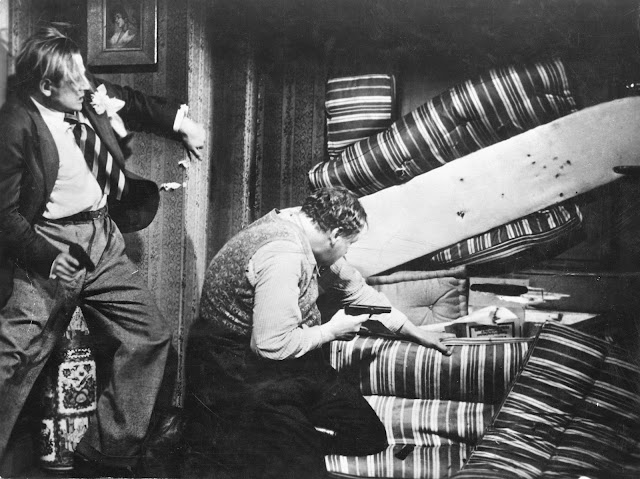 |
| 'Kent and Lilli are trapped in a room with an ominous ticking coming to strike them dead 'within three hours'. Like the Nazism spreading at the time, resistance seems futile' |
Whilst Cleopatra, another of Masters Of Cinema's September releases, fended off attention from the 1930 Hays Code, Fritz Lang's Das Testament Des Dr. Mabuse had an even more dangerous adversary to come to terms with in Germany, 1933. Banned in Lang's native land by Joseph Goebbels because the film 'proves that a group of men who are determined to the last...could succeed in overturning any government', the film premièred instead in Budapest.
Goebbels' fears, ultimately that the film would undermine the tactics used by the Nazis, proved to be well founded. Lang talked on numerous occasions about how the film was a 'fable' of Nazism, intended to show the tactics used by them to maintain power in the state. Mabuse's (Rudolf Klein-Rogge) plan, to perpetrate terror for terror's sake, spreading fear and uncertainty amongst the populace, has an eerie foresight to it that shows Lang's excellent awareness of current affairs. Late on in the film, Kent (Gustav Diessl) and Lilli (Wera Liessem) are trapped in a room with an ominous ticking coming to strike them dead 'within three hours'. Like the Nazism spreading at the time, resistance seems futile.
Whilst Lang accurately predicted the sweeping wave of right wing extremism in Germany, his true genius may be his apparent comment that this wave may not be the last. Mabuse, interned in an insane asylum, spreads his terror campaign by way of others. These others are instructed by a spectral figure behind a curtain. Is it Mabuse or not? No-one seems certain, or to care. A character refers to the title, Das Testament, at one point as being 'unlike a normal legacy', but Mabuse is unlike a normal man and the actions of others, on instructions and 'inspirations' left by him bear the hallmarks of some right-wing extremist groups today. Did Lang predict this too? Perhaps not in its entirety, but his recognition of the cyclical nature of violence and the way it filters through members of the population ensure his film's relevance both today and, sadly, probably forever.
 |
'Whilst Lang postulates in the background he, like all great directors, recognises that something needs to happen to enrapture the audience in the foreground. Here, Dr. Mabuse excels.'
|
Whilst Lang postulates in the background he, like all great directors, recognises that something needs to happen to enrapture the audience in the foreground. Here, Dr. Mabuse excels. As well as being Lang's treatise on Nazi Germany, this is one of the first police procedurals, as Commissioner Lohmann (Otto Wernicke) attempts to track down the underworld, after a tip-off by Hofmeister (Karl Meixner). The chase is thrilling and Wernicke's brusque, superhero-alike policeman (at one point, charging up to gunman, he is unharmed save for the hat being shot off his head) proves an entertaining hero to follow.
Lohmann's superhuman cop needs a supervillain to apprehend and in Mabuse he gets one. The claim that Mabuse set the template for many villains to come is nonsense (a powerful evil force is nothing new, look much earlier for original inspirations) but nevertheless he provides a great example of the origins of today's villains, pulled deep from early cinematic history.
Technically too the film is superb. A scene in which Lohmann and a colleague observe writing etched on to a glass window has the window pivoting this way and that to show the audience the text, then the character speaking, then the other character. You never see the camera. One suspects that, without expensive digital trickery, some of today's directors would have difficulty achieving the effects displayed in this scene.
The rest of the plot sees Mabuse suffer its main dilemmas. The story of Kent and Lilli is important only for Lang to show the nature of crime, its origins and its investments. Kent's story reasserts Lang's feeling that crimes of power are more dangerous than any other kind but his vehicle is weak and Lilli especially is needed only to make us a tad more dewy-eyed at the prospect of the duos' deaths. Once Lang gets to the final climax Lilli disappears without explanation and Kent becomes just another subordinate under the direction of Lohmann. There is an argument that there is a more focused cut of the film here somewhere - sans Kent and Lilli - which would fix the length problem, Mabuse feeling like it runs on perhaps fifteen minutes further than it needed to.
Klein-Rogge's supervillain too - and there is no other way to conclude but to discuss Mabuse himself - has a problem of appearance, with Lang himself admitting in the typically excellent accompanying booklet that he would have changed Mabuse's ghostly apparition to being one made of sound only, if he had his time again. As it is, the film's argument is let down by Mabuse's apparently supernatural air, hinting that this empire of terror is only possible with a spectral figurehead. The real truth, as Lang knew and as many found out mere years later, is much more terrifying than a white ghost and few pages of notes.
Founded in 2004, The Masters of Cinema Series is an independent, carefully curated, UK-based Blu-ray and DVD label, now consisting of over 150 films. Films are presented in their original aspect ratio (OAR), in meticulous transfers created from recent restorations and / or the most pristine film elements available.
Das Testament Des Dr. Mabuse is released in the UK on Monday 24th September


No comments:
Post a Comment